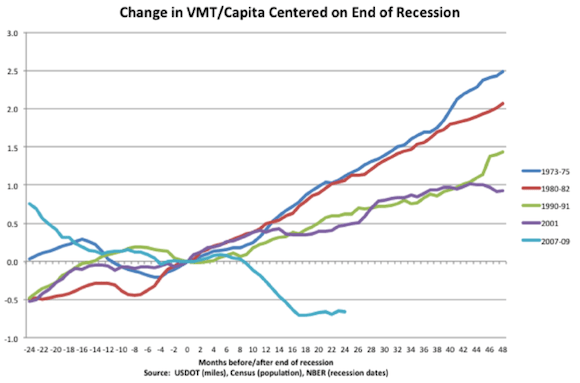
Since 2005, Americans have been driving fewer miles each year. While the shift predated the onset of the Great Recession, the question of whether the decline in driving marked a sea change in the way we get around or simply reflected a drop in economic activity has been a matter of considerable debate.
Enter economist Joe Cortright, who took a closer look at American driving patterns following the last five recessions. The results, which Cortright discussed during a panel at last month's National Association of City Transportation Officials conference, point to the emergence of fundamentally different American travel behavior.
Looking at the periods before and after the last five recessions, Cortright charted vehicle miles traveled (VMT) per capita in the United States on a monthly basis, indexing the last month of each recession to zero. In four of the five recessions, driving was either increasing or stagnant in the two years before the economic slowdown, and it quickly picked up steam during the recovery.
The only exception was the most recent recession, which lasted from December 2007 to June 2009. Before the recession, driving per person was dropping. After the recession, driving continued to fall. In other words, Cortright says, the recession has little to do with what is actually a long-term trend.
"As the recession ended, driving continued to decline," Cortright said. "And the reason is the increase in gas prices." In the past decade, he noted, the inflation-adjusted price of gasoline has tripled.
But pocketbook concerns aren't the only factors at work. There is a generational shift, as well. Cortright pointed out that the drop in driving is particularly pronounced for people in their teens and twenties. Today's teenagers are getting their licenses later than previous generations, and young people are increasingly opting to live in cities.
In neighborhoods within three miles of a central business district, the population of college-educated 25-34 year olds grew 26 percent since 2000 -- twice as fast as in the rest of the metropolitan area, according to a report Cortright authored for CEOs for Cities. Many people who might otherwise live in the suburbs are choosing instead to live in places where they can get around by walking, biking, and taking transit.
Put together, these economic and cultural changes are leading to less driving -- and this trend shows up in more than just the federal VMT data, Cortright explained. He looked at data from Inrix, a private firm that monitors and predicts traffic flow, and found that congestion in U.S. metropolitan areas has been dropping as well.
"The recession has been over for three years and driving continues to decline," Cortright said. It's a fact that Congressional leaders can no longer afford to ignore as they prepare to draft the next surface transportation bill.





